Tokyo 2020: Kaylee McKeown begins her Games with Olympic record
Australia’s new queen of the pool has sent a message to her biggest rivals. But will her ultimate plan to land the gold pay off?
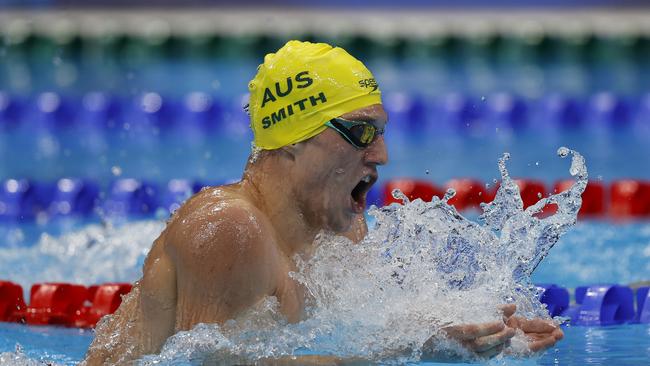
Olympics
Don't miss out on the headlines from Olympics. Followed categories will be added to My News.
Australia’s new queen of the pool Kaylee McKeown has started her Olympic campaign with a roar, claiming an Olympic record and qualifying fastest for Monday’s semi-finals in the 100m backstroke.
McKeown had dropped out of the 200m individual medley and abandoned a possible gold medal to focus on this event, where she is the world record holder.
That late decision was controversial, but McKeown and her coach Chris Mooney felt having to swim the heats of the medley the night before Tuesday’s backstroke final was too stressful for the Olympic debutant.
McKeown is approaching the one-year anniversary of the death of her beloved father, Sholto, who died of a brain cancer just two years after the medical diagnosis. McKeown felt the one year postponement of the Olympics was fortuitous as it enabled her to spend more time with her sick father.
Tattooed on her foot, as a last-second reminder before the starting whistle, is a line from her Dad: “I will always be with you”.
On Sunday night in a slick race to dust off any nerves, the 20-year-old Queenslander was never headed in the heats after a brilliant start, posting 58.88s.
That time was more than a second shy of her world record set in June, but significantly it was a psychological booster, being faster than that posted by previous world record holder Regan Smith, of the US, clocked in the earlier heat, of 57.96s.
“It was pretty nerve wracking heading out there,” she said, noting that the nerves had been cleared out and “hopefully I am moving onwards and upwards’’.
McKeown has observed how the times of the morning finals has been dramatically slower than the heat times posted in the evening — perhaps a result of a mix of little sleep the night before the finals and the high humidity levels in the pool in the morning.
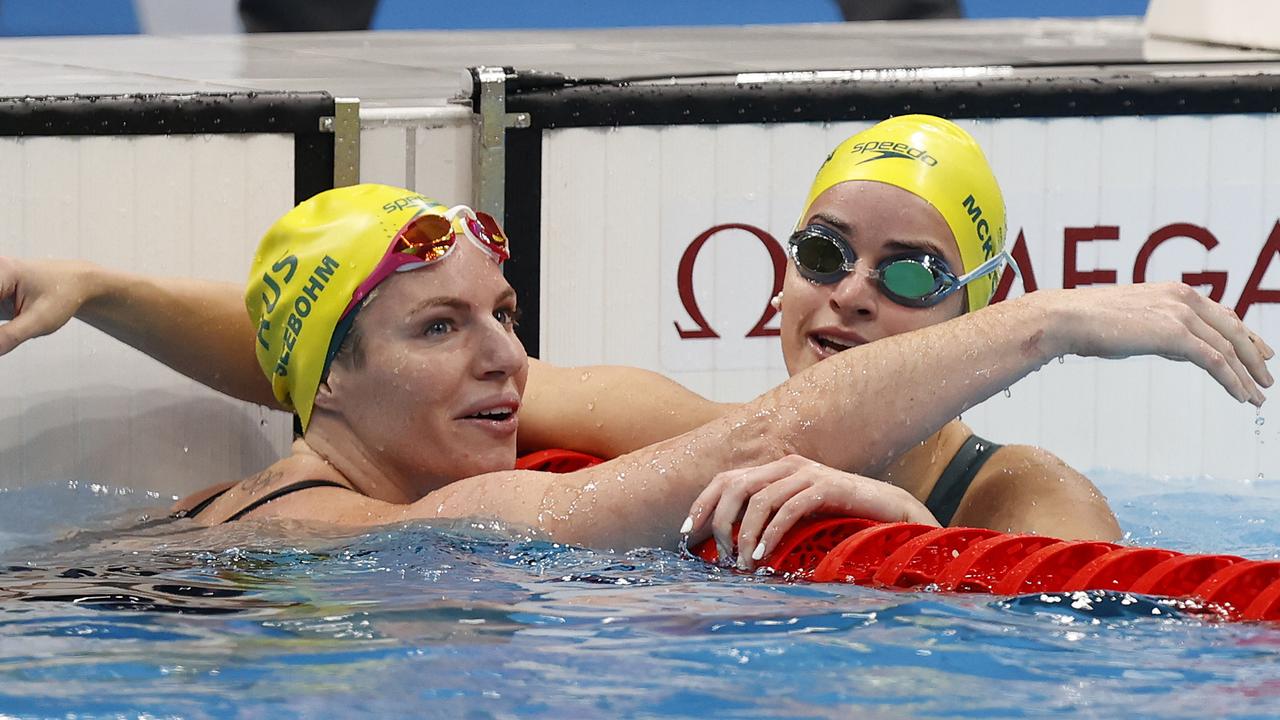
“I just want to give it my best and hopefully make the final,” she said.
McKeown’s close rivalry with Smith — still in its fledgling stages — was something she wasn’t thinking about at the moment.
Said McKeown: “I think I put the pressure on myself to be honest. I like the nerves, it means you’re about to do something special and you care about what you’re doing. As long as I’ve got those nerves, I’m happy.’’
Australia’s two-time Olympic gold medallist Emily Seebohm, 29, has also swum through to the semi-finals, finishing third behind McKeown and Briton Kathleen Dawson and qualifying as fifth fastest.
AUSSIE DELIGHT IN THE RACE TOO TOUGH FOR PHELPS
Will Swanton
Here’s the race that proved too hard for Michael Phelps. The lung-busting event that amounts to four 100m sprints. A butterfly sprint and then a backstroke sprint and then a breaststroke sprint and then a freestyle sprint.
When the great Phelps finished fourth in the 400m individual medley at the London Games, he climbed out of the pool and told his coach he was never doing the bloody thing again.
Here’s a race for the ironmen. In shorter races and even the longer freestyle races, normally one thing hurts. You’re doing the same stroke and using the same muscles over and again. In the 400m individual medley, everything hurts.
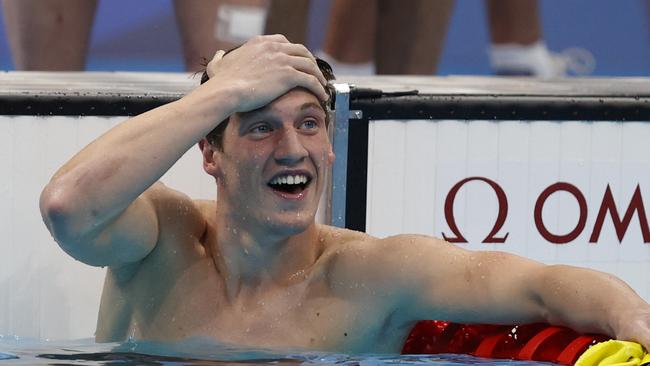
Here’s the 21-year-old Victorian Brendon Smith, the fastest qualifier for the final of the Tokyo Olympics, standing where he hasn’t expected to be. Lane four for the gold medal race.
In prospect, he’s another Duncan Armstrong and Jon Sieben, another bolt from the blue. But any medal will do when you’ve come from nowhere.
Here’s a young fella who’s tough as nails after spending most of the past 18 months trapped in the darkness of Victorian lockdowns. He’s been restricted in his training and his life, unable to travel to Queensland and prepare with the rest of Australia’s team in a warmer climate, swimming instead in freezing ocean waters.
He has been going it alone, to a degree, but he’s gone all right. Ranked 26th in the world two years ago, he’s knocked 5.5 seconds from his personal best in the past six weeks. Good timing.
Here’s Smith staring down his lane, his road to an Olympic medal if all goes to plan. There shall be no easy way to do it, everything’s about to hurt. He crouches, leaps, gets going. He’s fourth after the butterfly leg. Which is OK. He’s third after the backstroke. Great. The breaststroke is the make or break leg in medleys. It’s usually everyone’s weakness. Smith falls to last.
We should have known it was too good to be true.
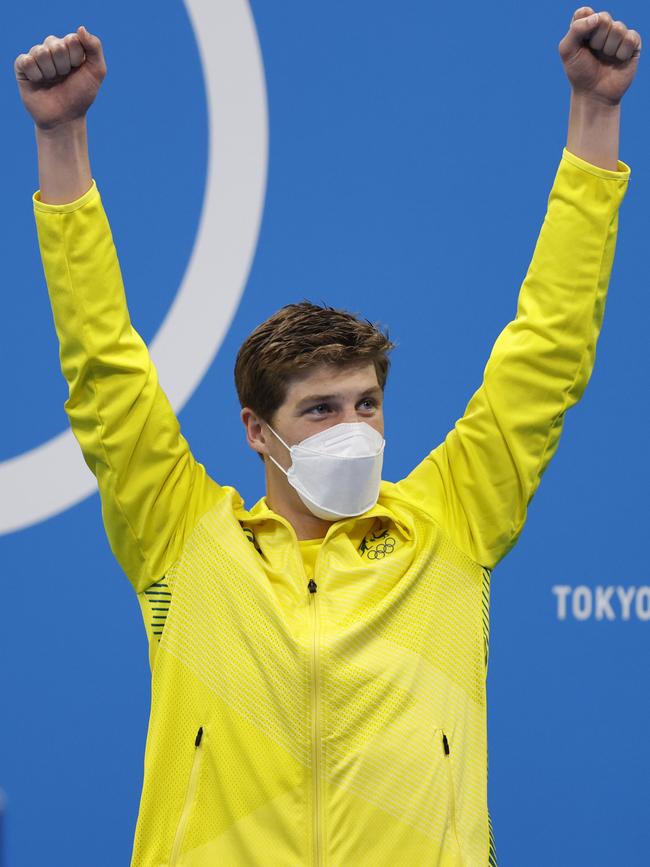
But then he rips through the freestyle as if his life depends on it, snatching a bronze medal that leaves him absolutely stoked.
Americans Chase Kalisz and Jay Litherland are top of the time sheets. Smith has clocked 4min10.38sec. His semi-final time of 4:09.2 would have won gold; Kalisz has won a relatively slow final in 4:09.42. Smith may have spent too much gas the previous evening but here he is on the podium, breaking Australia’s duck.
The Australian banner goes up with a couple of star-spangled ones. Bronze? He’d have taken that before he got here. He raises his left arm and pumps his fist. There’s only one winner in any sporting battle, but at an Olympics you sort of get three.
“Unbelievable. I can’t believe it,” Smith said.
“Twelve months ago when the Games were cancelled or postponed, I thought ‘Give me another opportunity, another year to better my preparation from last time’. To improve that much and to be able to get on the podium is incredible. Thank you so much for supporting me. I can’t believe it.”
The 400m IM gets a bad rap in Australia because we’ve never been any bloody good at it. Only one medal had previously come from it, the bronze to Rob Woodhouse at the 1984 Los Angeles Games.
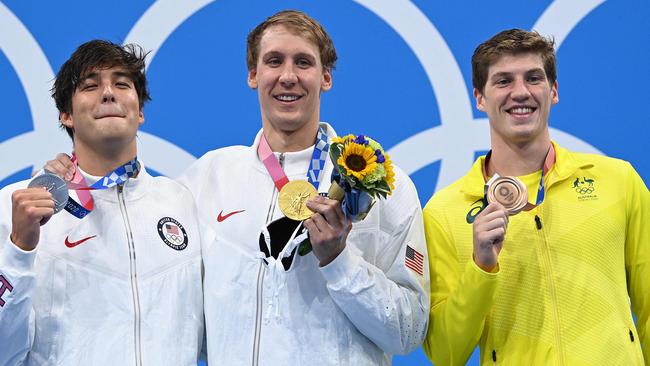
Ironically enough, that race was won by Canadian Alex Baumann – who’s now Australia’s boss of high-performance.
Results are relative at the pool. While Jack McLoughlin was disappointed with silver in the 400m freestyle, Smith was buoyed by his bronze.
He said of his long, long months in Melbourne’s lockdown: “It did feel like the Olympics was never going to come. There was a long time there where I didn’t really know what I was aiming for. To get up in the final and do the swim I did, I’m really happy with it. I’ve gone through hell to get here, having to swim in the ocean for two months in Melbourne when it was getting to 12 degrees. I’m really happy with how I built that final hundred and got to the wall.”
Thorpe’s brutal reality for Aussie medallist
Julian Linden
Brendon Smith has won Australia’s first medal at the Tokyo Olympics after collecting bronze in the men’s 400m individual medley.
Virtually unknown before he arrived in Japan, Smith swam like a man possessed on his final lap to finish third in 4:10.38, just outside the Australian record he set in Saturday’s heats.
Smith became just the second Australian man to win an Olympic medal in the 400 medley, the most gruelling event in the pool, joining Rob Woodhouse who also won bronze in 1984.
Smith qualified fastest for the final with a semi-final time that would have won him the Olympic gold but was unable to repeat that effort and keep up with the American pair of Chase Kalisz and Jay Litherland, who took gold and silver.
However, he did an amazing job to get on the podium.
The 21-year-old was last heading into the concluding freestyle leg and seventh when he turned on the last lap but stormed home to open Australia’s medal count.
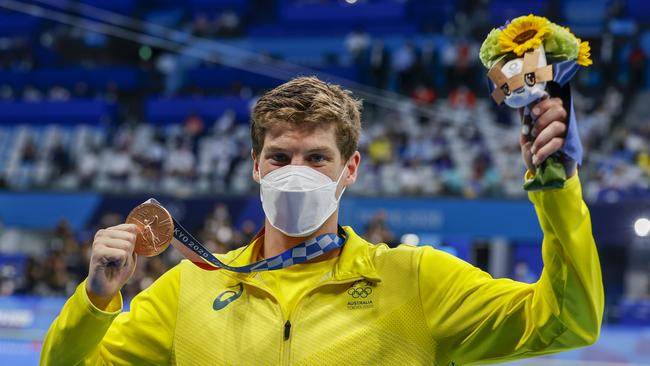
“That is fantastic to see. Brendon Smith at his first international meet, his first Olympic Games to come away with a bronze medal. He wouldn’t have been expecting that,” Ian Thorpe said on Channel 7.
“The thing that’s tough here, I have to point it out, is if he had swum the time he did in the heat he would have won that final.
“And it’s being able to back up from those races and what you do in recovery to be able to get the best out of yourself but still a bronze medal, if you asked him before he came in to these Olympic Games, I doubt he would have said he would have expected to medal.”
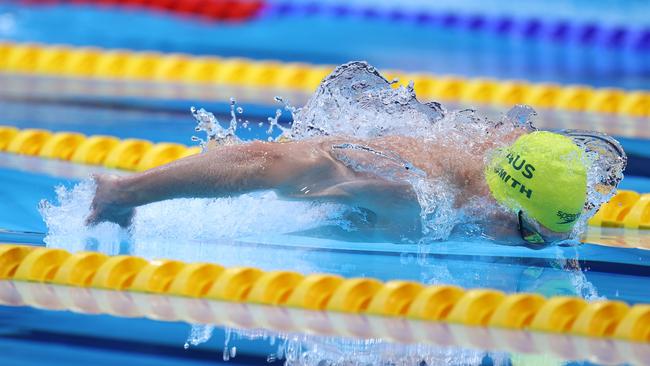
Smith told Channel 7: “Unbelievable. I can’t believe it. 12 months ago when the Games were cancelled or postponed, I thought give me another opportunity, another year to better my preparation from last time so, you know, to improve that much and to be able to get on the podium is incredible.”
Back home in Australia Smith’s proud family couldn’t believe he had medalled at his first Olympic Games.
Sister Nerice Smith said her family were sad to not be in Tokyo, but were with him every step of the way.
“We are over the moon, there were so many tears,” she said.
“We got a bit nervous after the breaststroke.
“But he came home in the freestyle. We’re just so proud. We didn’t expect him to swim as fast as he did in the heat, that was a surprise.
“But he always believes in himself.”
Ms Smith said Brendon’s sudden rise to the top was a surprise.
“It is absolutely a surreal moment,” she said.
“We were hoping he would make the Olympics but we didn’t expect finals, and to come away with a medal is absolutely amazing.”
She said her brother wasn’t a good junior swimmer and didn’t take it up seriously until his mid-teens.
President of Melbourne’s Half Moon Bay Surf Life Saving Club Cliff Goulding said members were “over the moon”.
“We are absolutely ecstatic for Brendon,” Mr Goulding told News Corp Australia.
“The whole club is walking around with Brendon T-shirts on, taking photos in front of the TV. We are all very excited, he is such a gentle, well meaning kid, a great competitor.”
Smith, from Donvale in Melbourne’s east debuted at the games and swum a personal best in his heat on Saturday night.
He grew up doing nippers with the club and patrols and competes when he can.
“Everyone is so happy he got a bronze medal,” Mr Goulding said.
“We are so proud, his family are so proud.”




